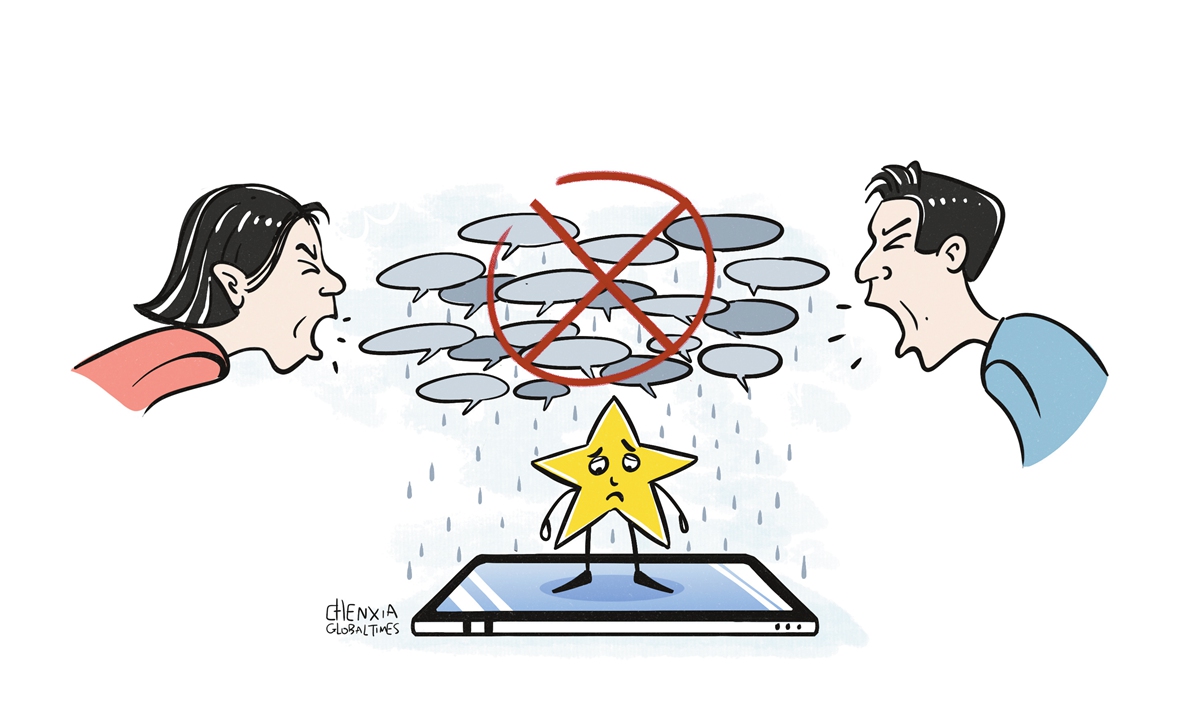A 29-year-old woman surnamed He was detained by police for posting on Sina Weibo inflammatory as well as defamatory comments about Chinese athletes and coaches, following the table tennis women's singles final at the Paris Olympics, according to Beijing police on Monday.

Illustration: Chen Xia/GT
The arrest came after Beijing police received reports from the public about the posts, which were found to be harmful due to their malicious and false nature. He has been placed under criminal detention while the investigation continues.
Meanwhile, Sina Weibo announced on Tuesday that several influential users and marketing accounts, which had been maliciously speculating about coaches and posting attacks against athletes, have been banned from speaking.
The arrest of the woman for defamatory comments about Chinese athletes participating the Paris Games underscores the authorities' determination to curb the negative impact of toxic fan culture and maintain the integrity of sports.
The case also exposed the urgent need to eliminate profit-driven manipulation of the sports fan community.
The arrest was preceded by an official crackdown on over 800 Chinese social media accounts that had been spreading negativity and fomenting conflict during the table tennis events at the Olympics, with more than 50,000 inappropriate fan posts being removed.
Chinese paddler Chen Meng won the women's singles gold medal at the Paris Games by defeating her teammate Sun Yingsha 4-2, but the tantalizing all-Chinese final that deserved celebration turned shameful when many fans on the stand showed favoritism toward Sun while booing Chen.
After the match, there was a flood of online attacks targeting Chen and the coaching staff of the Chinese table tennis team, which went far beyond legitimate criticism of the athletes and even crossed into illegal territory.
Both Chen and Sun turn out to be the victims of a distorted fan culture centered on the idolization of public figures.
Such toxic fan culture leads to selfish displays and negative behaviors that can harm the sports community and overshadow broader values such as patriotism and sportsmanship.
The chaos in fan circles may appear to be the unconscious actions of individual fans, but behind the scenes, there are often profit-driven manipulators disguised as "fans."
To gain traffic, seek business opportunities, and attract attention, some instigators exaggerate, fabricate, create something out of nothing, sow discord, and foster opposing sentiments. Ultimately, these actions, which harm the development of Chinese sports, are driven by the lure of profit.
The majority of the fan community are minors. Due to their lack of social experience, they are easily influenced and incited by malicious individuals, leading to irrational and even illegal actions.
Therefore, to address toxic fan culture in sports, it is essential to hold extreme fan groups accountable. However, it is even more crucial to tackle the root of the problem by identifying and targeting the instigators behind these actions.
After China's 3-0 sweeping win against Egypt to reach the quarterfinals of the table tennis women's team event on Monday, Chen, who had partnered with teammate Wang Manyu for the match, looked confident and shared her thoughts on the excellent teamwork of her fellow athletes.
"Our mutual trust is so deep that a simple glance can convey our feelings and intentions to each other," Chen said.
Deng Yaping, China's table tennis legend, has advocated maintaining the integrity and respect inherent in sportsmanship, emphasizing that while it's normal for fans to have their favorites, this shouldn't lead to hostility.
"Everyone has the right to like someone. You just need to show your affection; there is no need to attack other players," Deng said.
Deng said that the evolving nature of fan support in sports is a normal phenomenon.
"Traditionally, fans were drawn to table tennis because they loved the sport, and then they developed admiration for the players. However, nowadays, some fans are first attracted to specific athletes and then become interested in the sport itself."
Critics argue that verbal attacks against athletes and coaches should not be considered part of the culture but rather a harmful "tumor" that needs to be rooted out.
In May, during a working conference held in Guangzhou, South China's Guangdong Province, the General Administration of Sport of China urged all parties within the national sports industry to resolutely resist the erosion of the sports sector by toxic fandom culture.
Toxic fandom culture has even led to conflict among fans, disrupting the harmonious atmosphere traditionally associated with sports. Instead of coming to appreciate the matches, spectators often engage in aggressive cheering for their favored athletes while attacking competitor players, turning the sports arena into a battlefield, which represents a significant departure from the true spirit of sportsmanship.
The case of arresting the woman for defamatory comments about Chinese table tennis athletes and coaches at Paris 2024 highlighted Chinese authorities' ongoing crackdown on inappropriate online behavior and their efforts to preserve the spirit of sportsmanship and prevent the negative aspects of toxic fan culture from tarnishing the values that sports stand for.
The author is a reporter with the Global Times.
life@globaltimes.com.cn




